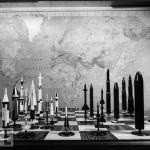CONTENTS
- DETERRENCE: Statement on NNSA defense nuclear nonproliferation and naval reactors activities
- DPRK: North Korea’s new target: the armistice
- GOVERNANCE AND CIVIL SOCIETY: Seoul to resume humanitarian aid to North Korea
- CLIMATE CHANGE ADAPTATION: When disasters and conflicts collide: improving links between disaster resilience and conflict prevention
- AUSTRAL PEACE AND SECURITY: Marines in Darwin – make it so
See this week’s blog: Shaping the Strategic Environment Not Bad Behaviors, from our Energy Security contributor, Peter Hayes.
DETERRENCE: Statement on NNSA defense nuclear nonproliferation and naval reactors activities before the Subcommittee on Energy & Water Development House Committee on Appropriations, Neile Miller (26 February 2013) [PDF, 62.6KB]
Sequestration will degrade DOE/NNSA programs to ensure a safe, secure and effective nuclear weapons stockpile, nuclear nonproliferation and nuclear security programs, naval nuclear propulsion, and nuclear counterterrorism and emergency response capabilities.
- DOD nonproliferation work to suffer under budget cuts, Diane Barnes, Global Security Newswire, (4 March 4 2013)
- Budget impacts loom for U.S. nuclear deterrent, Diane Barnes, Global Security Newswire (5 March 2013)
- Reflections on the Deterrence Summit, G. Mello, Los Alamos Study Group, Bulletin #165 (27 February 2013)
 BLOG: Shaping the Strategic Environment Not Bad Behaviors
BLOG: Shaping the Strategic Environment Not Bad Behaviors
by Peter Hayes – Deterrence Contributor
At the Asan Institute Nuclear Forum 2013, I argued that US vital interests in the region…
DPRK: North Korea’s new target: the armistice, Nicholas Kristof, The New York Times (31 August 1995)
North Korea threatened to quit the Military Armistice. They have issued this largely symbolic threat numerous times since 1994. After China normalized relations with South Korea in 1992, South Korea cannot be cut from negotiations. There is an increased possibility of miscalculation as forces on both sides of the DMZ conduct military exercises. Some Chinese want to “cut off” North Korea – but only in English-language publications.
- Report: North Korea threatens to end armistice, Laura Smith-Spark and Jill Dougherty, CNN (5 March 2013)
- Large-scale military drill likely in N. Korea next month: official, Yonhap News Agency (28 February 2013)
- Shifting emphasis: Beijing’s reactions to North Korea nuclear test, Jia Qingguo, East Asia Forum (3 March 2013)
GOVERNANCE AND CIVIL SOCIETY: Seoul to resume humanitarian aid to North Korea, Kang Tae-hwa and Kim Hee-jin, Joongang Ilbo (2 March 2013)
The ROK will resume humanitarian aid to the DPRK in a trust-building effort, part of a’ two-track strategy’ of supporting UN sanctions on the DPRK while simultaneously pursuing ‘trust-building’ policies such as providing aid. China will join the UN Security Council in new sanctions on the DPRK amid signs that China is reconsidering its DPRK policy and may be cooling on the alliance. In response, the DPRK threatened to sever its military ‘hotline’ with the US.
- S. Korea leader offers North ‘flexible’ engagement, Channel News Asia (1 March 2013)
- More within China criticizing support of North Korea, Park Min-hee and Seong Yeon-cheol, Hankyoreh (1 March 2013)
- U.S., China agree U.N. sanctions draft; North Korea renews threats, Louis Charbonneau and Michelle Nichols, Reuters (5 March 2013)
CLIMATE CHANGE ADAPTATION: When disasters and conflicts collide: improving links between disaster resilience and conflict prevention, Katie Harris, David Keen and Tom Mitchell, Overseas Development Institute – ODI (February 2013) [PDF, 9.5MB]
A number of high profile disasters in fragile and conflict-affected countries have increased attention on the concurrence of disasters and conflict, and there is an expectation that disasters and conflict will coincide more in the future. Climate change, continued urbanization, food price fluctuations, financial shocks and other stresses may all shape – and complicate – future trends in the disaster–conflict interface.
- Political aftershocks: The impact of earthquakes on intrastate conflict, Dawn Brancati, Journal of Conflict Resolution, vol. 51, no. 5 (2007) [PDF, 2.26 MB]
- Earthquakes, hurricanes, and terrorism do natural disasters incite terror? Claude Berrebi and Jordan Ostwald, RAND Population Research Center (2011) [PDF, 984 KB]
AUSTRAL PEACE AND SECURITY: Marines in Darwin – make it so, Andrew Davies and Mark Thomson, The Strategist (ASPI) (1 March 2013)
Sequestration would only make Washington even more eager for its partners in the Asia–Pacific to step up and provide some of the resources required to execute the US rebalance. Already, it’s clear that there’s disappointment in Washington about the allied response. Australia could do its ally—and itself—a big favour by putting some money on the table to properly support the establishment and ongoing maintenance of the US training mission to Northern Australia.
- Defence plan ‘shoots for moon’, Brendan Nicholson, The Australian (3 March 2013)
- $2bn Triton drone plan to track asylum boats off Australia, Ian McPhedran, The Australian (22 February 2013)
- F-35 fighters to cost $90m each, Brendan Nicholson, The Australian (28 February 2013)
The Nautilus Peace and Security Weekly Report presents articles and full length reports each week in six categories: Austral security, nuclear deterrence, energy security, climate change and security, the DPRK, climate change adaptation and governance and civil society. Our team of contributors carefully select items that highlight the links between these themes and the three regions in which our offices are found—North America, Northeast Asia, and the Austral-Asia region. Each week, one of our authors also provides a short blog that explores these inter-relationships.
Subscribe to NAPSNet to receive free weekly email reports Editor
Contributors
- Deterrence: Peter Hayes
- Governance and Civil Society: Dyana Mardon, Yi Kiho
- Climate Change Adaptation: Saleem Janjua
- DPRK: Roger Cavazos
- Energy Security: Nikhil Desai
- Austral Peace and Security: Richard Tanter

